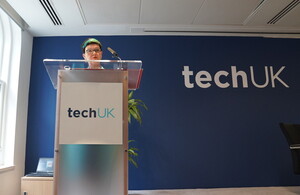Data and technology innovations will transform UK border
Cabinet Office Minister Baroness Neville-Rolfe spoke at techUK about new data and technology innovations that could transform the UK border

New data and technology innovations could transform how goods move across the UK border according to Cabinet Office Minister Baroness Neville-Rolfe, who spoke at techUK today (Wednesday 28 June).
In her speech, the Minister outlined how pilot projects, carried out by the Government in collaboration with industry, successfully tested the use of supply chain data and a range of new technologies to manage the movement of goods over the UK border.
The pilots found that using readily available supply chain data can reduce the administration burden of the customs declaration process by 40%, potentially saving traders an average annual cost of up to £225 million when fully scaled up.
At a more ambitious level, the pilots found that using readily available supply chain data can fulfil around 80% of customs data requirements at the border. Estimating an 80% reduction in costs would equate to an associated average annual cost saving of £365m to traders over a 10-year period.
Existing supply chain data can also speed up decisions at border control posts by 17% in some cases, meaning traders could get their goods through the border quicker.
The pilots also tested technologies including smart seals, GPS trackers and temperature trackers, finding that they can provide Government with vital intelligence about goods and the risks they may pose.
These pilot projects are part of the Ecosystem of Trust (EoT) Evaluation, a border model in development as part of the 2025 Border Strategy which supports the UK’s ambition of having the world’s most effective border - one that creates prosperity and enhances security for a global United Kingdom. The EoT Evaluation will be published this summer.
Speaking at the Border Strategy 2025: Opportunities for Tech Companies & Consortia event at techUK, Baroness Neville-Rolfe said:
Innovation sits at the heart of our approach to the border. Our pilots have shown that if we can apply this innovation to remove non-tariff barriers to trade, we will make exporting and importing easier and create a world-leading approach to border policy and design.
The border is one of the most complex systems of policy, technology and process that exists, and government and industry must work hand-in-hand to transform it.